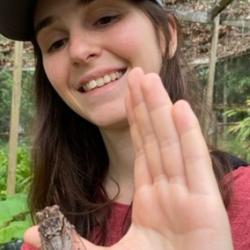Ash Simkins
I am a 3rd year Zoology PhD student in the Conservation Science group, supervised by Professors Bill Sutherland, Lynn Dicks and Dr Silviu Petrovan, funded by NERC C-CLEAR. My research aims to leverage a wide range of available information to understand patterns in which conservation actions work, for which species, and use this to suggest effective actions for species without evidence on what works to conserve them.
My journey to the PhD has been varied. I studied the BA in Natural Sciences (Zoology) here in the department (including a summer research project in Biomechanics), worked as a research assistant and web de
veloper, studied the MSc in Applied Ecology and Conservation at the University of East Anglia (with BirdLife International and the RSPB) and worked in BirdLife International’s science team. This experience studying and researching in the department and the adjacent Cambridge Conservation Initiative (CCI) helped me develop my own PhD proposal and gain essential experience, and encouraged and inspired me to (successfully) apply for the PhD and funding (after being unsuccessful applying for PhDs previously).
As a conservation scientist, the links between the Zoology Department and the CCI was a huge draw to this PhD and department, which enables me to undertake really collaborative applied work that (I hope!) will be useful and make a difference. I have collaborated with researchers in the department, CCI and even wider as a result of these connections, which sets up students well for careers both in and outside of academia. As does links with the Museum of Zoology and other organisations. I have also been encouraged to pursue exactly what interests me, which is an incredible opportunity.
The department is also an incredibly vibrant, supportive and friendly community of researchers and staff, from PIs and postdocs to postgraduate and undergraduate students to administrators. Everyone is willing to help one-another with anything, even just listening to someone’s concerns/problems. Students can also get involved with a range of things in the department, including outreach, teaching, the museum and sports teams. I was postgraduate rep and have supervised many students, which was rewarding and a great way to contribute to the department. There are also regular talks covering a wide range of topics (from diverse career stages and backgrounds), and lots of opportunities to present research, helping develop well-rounded researchers. With few Zoology departments remaining in the UK, it’s such a unique place to work.
Malou Bastiaanse
Marine Behavioural Ecology Group
I started my PhD project at the Marine Behavioural Ecology Group last fall. Under the supervision of James-Herbert-Read and David Sumpter, I investigate the fundamental principles that underly synchronous chorusing. Males of various species, including fireflies, cicadas, and tree frogs, synchronise their mating signals. This offers an interesting evolutionary puzzle: why blend in with your competition when signalling for limited female attention? My project focuses on the synchronised calling of the razor grinder cicada, whose collective chorus travels as an audible wave across the landscape. By combining empirical and experimental fieldwork with computational modelling and data analysis, I hope to get a better understanding of the mechanisms and underlying function from which synchronised choruses may arise.
As my methodology and background are interdisciplinary, I qualified for the EPSRC-Zoology Studentship. This studentship funds my 4-year PhD stipend and allows me to go on multiple fieldwork trips with the necessary equipment. In my brief time here, I’ve found that the department is a place that fosters growth. Before my PhD, my engagement with biology was primarily through theory and mathematical models; whereas my fieldwork in Australia allowed me to observe and interact with my study species up close. Courses and workshops offered by the department and university have helped me with fieldwork preparations and data analysis. But most importantly, it is easy to seek advice when facing a problem, whether from peers or early-career scientists or at weekly meetings with your supervisor.
Doing a PhD at Cambridge seemed daunting at first, as the imposter syndrome can easily creep in, but so far, the department has provided an incredibly accepting environment. There is plenty of opportunity for socialisation with other graduate students and staff, such as at Zoology Happy Hour, grad tea talks, or simply over lunch with your lab group. If you're seeking new ideas for your project, there are lots of seminars and talks to attend, or alternatively, walk down one flight of stairs and be inspired by the exhibits from the Zoology Museum.
Ritabrata Chowdhury
I am a PhD student at the Insect Biomechanics Workgroup (with Prof Walter Federle) and the Insect Evolution and Genomics Group (with Dr Erika de Castro and Prof Chris Jiggins), working on the biomechanics and evolution of insect-plant interactions. More specifically, I look at how plants use physical defences to protect themselves against herbivorous insects and how some insects have counter-adapted against them, by comparatively studying systems from two different continents, the Passion-vines and Heliconiini caterpillars from Central and South America and Macaranga ant-plants and Arhopala caterpillars from South-East Asia.
The community of senior academics, staff and students at the Department of Zoology has been monumental in my journey so far and is definitely the perfect stepping-stone for my future. They have always supported me and provided me with insights, resources, collaborations and friendships, that I believe will have an everlasting positive impact on my professional and personal career.
The Department provides opportunities for all students to attend various talks, seminars and workshops on both research and non-research related topics, access to multiple top-of-the-line facilities such as the microscopy and the CT-scanning facilities and the chance to work with the Museum of Zoology and utilise its wonderful collections for both research and outreach. Moreover, the Department also organises a weekly Happy Hour and a Grad Tea Talk, an annual Postgraduate Symposium, a Seminar Day and an Alumni Day, and lots of other academic and non-academic gatherings to share one's research and/or share the passion for all organisms on this planet.
Matilda Sibeth
Marine Behavioural Ecology Group
I am currently studying for an MPhil in the Marine Behavioural Ecology (MBE) Group, supervised by Dr James Herbert-Read. My project uses sandeels (Ammodytes tobianus) as a model system to understand how animals organise themselves spatially. Sandeels are a small, social inshore fish that alternates between burying in sand and swimming in the water column. Whilst buried, individuals are unable to use visual cues to assess the relative positions of their neighbours, so are likely to rely upon other sensory modalities to determine their spatial proximity to others. Therefore my project aims to understand whether sandeels have a preferred optimal packing density, th e mechanisms that are used to maintain this spatial arrangement and the impact that spatial organisation in sediment has on coordinated emergences from sand.
Through my MPhil project, I have been able to delve into my interests further, explore new areas within the field of Behavioural Ecology and develop my research skills. This has only been possible because of the support from my supervisor and research group, and my access to the aquarium facility where my research is based. My work in the aquarium has taught me so much about animal husbandry and has provided me with extensive experience in carrying out behavioural experiments on live animals. My independence as a scientist has grown exponentially, and I now feel really prepared for a future in academia.
The community fostered by the Zoology department is incredibly friendly and welcoming. There are so many opportunities to meet researchers from other lab groups, whether this is via social events like the weekly happy hour and the Christmas party or through department seminars and graduate tea talks. I have loved my time in the Cambridge Zoology department so far, and would recommend studying for an MPhil here if you want to join an interesting and vibrant community of researchers whilst contributing to really exciting scientific discoveries.




